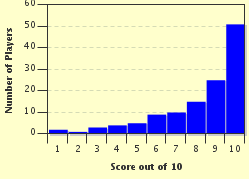Quiz Answer Key and Fun Facts
1. This long-time Canadian-born player was captain of an Original 6 team for twenty years, starting in the mid '80s. He led his team to three Stanley Cup championships (1997, 1998 and 2002); he also won many individual awards. His jersey number 19 was retired by his team in 2007; who is he?
2. This long-serving captain of the Boston Bruins began playing for the team in 1979. He scored a goal in his very first game and won the Calder trophy for Rookie of the Year. He began serving as captain in 1985 and stayed in the role until he asked to be traded in 2000. Who is this player?
3. Despite a long-standing NHL rule stating that goaltenders cannot serve as team captains, the Vancouver Canucks named who as their captain just before the 2008-2009 season?
4. This hot shot was a first overall draft pick in 2005 and immediately became a superstar when he began playing that fall. After only his second season, he won the Art Ross trophy for leading the league in points scored (120 points total), the first player still in his teens to win the award. He also became the league's youngest permanent captain ever at the start of the 2007-08 season; who is he?
5. This player wore a C for captain on two different team jerseys over the course of his two decades of NHL play, but technically he played for the same franchise for his whole career. He led his team to two Stanley Cups, and when his jersey number was retired following his retirement in 2009, a captain's C was included on the banner. Who is this captain?
6. Over 25 seasons of playing in the NHL, this player won six Stanley Cups, with two different teams. He captained his team to the ultimate prize for two of those wins, and was nicknamed "The Messiah" for leading his second team to the Cup. Who is he?
7. This long-time captain played close to 1200 games for a Canadian team before joining another team in 2013. Not selected until the 6th round of the 1994 NHL draft and not expected to amount to much, he won the Rookie of the Year award in his debut season (1995-96) and turned out to be an invaluable asset to his team. He became the longest-serving actively playing captain in the NHL in 2009, as well as the longest-serving European captain ever the same year. Who is he?
8. This defenceman was the captain of the New Jersey Devils for 12 years. In addition to being a great defenceman, he was known for being a physical hard-hitting player and didn't do too badly at scoring goals either. In fact, he scored a goal with the first shot on goal he made in his first NHL game ever. He retired in 2005 following the NHL lockout year. Who is he?
9. A member of the Order of Canada, this all-time great became captain of his team in 1987. He led them to back-to-back Stanley Cups, in 1991 and 1992. When he came out of retirement in 2000, he did so without the C on his jersey, but he resumed the position in 2001. A great goal scorer, a great leader and a great team player, he was inducted into the Hockey Hall of Fame almost immediately after announcing his first retirement, despite the customary three-year waiting period. He not only played his entire career with the same team, he bought the team in 1999. Who is he?
10. It would be near impossible to count the awards and accolades accumulated by this legendary player throughout his long career. In his first year of NHL play, he scored 50 goals. A few seasons later, he accomplished the rare feat (first done by Maurice Richard) of scoring 50 goals in 50 games - only he did it in just 39 games. When he retired, he held 61 records, including the record for the most MVP titles bestowed upon any player in North American professional sports, not just the NHL. He captained three of the four teams he played with, including leading one of them to four Stanley Cup wins in five seasons. Who is he?
Source: Author
guitargoddess
This quiz was reviewed by FunTrivia editor
stuthehistoryguy before going online.
Any errors found in FunTrivia content are routinely corrected through our feedback system.

